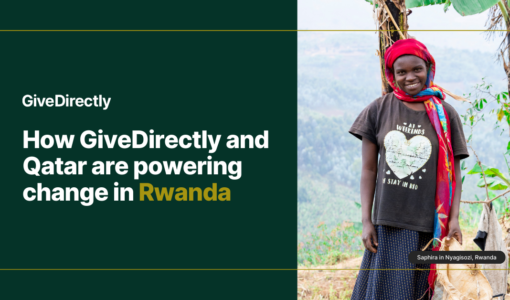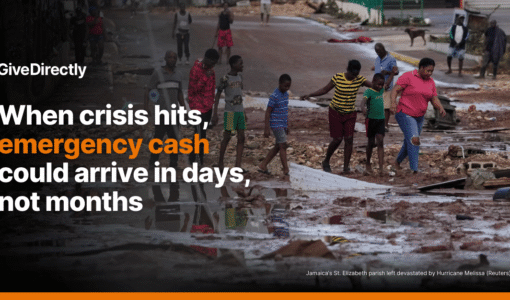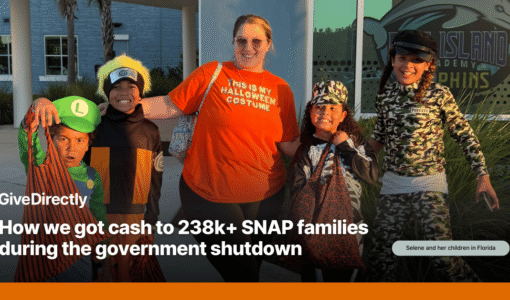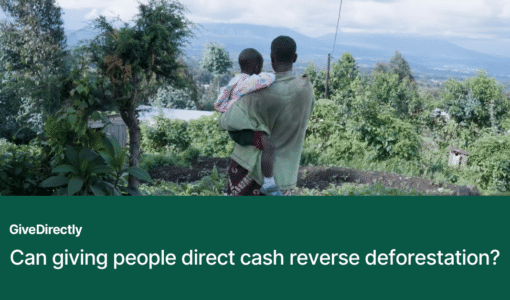This week one of GiveDirectly’s co-founders, Michael Faye, appeared on LinkedIn’s podcast, and all five of our basic income principal investigators co-authored an essay for LinkedIn’s featured weekend essay. Both pieces centered on how more evidence is needed in the basic income debate. Elsewhere, Mark Zuckerberg expressed support for basic income in his Harvard commencement and a new study from Iran shows the impact of a basic income look-alike program.
GIVEDIRECTLY IN THE NEWS
1. Basic income could transform society. But first, it needs to be tested.
LinkedIn, Abhijit Banerjee, Michael Faye, Alan Krueger, Paul Niehaus, Tavneet Suri, May 27, 2017
The time has come to find out. In 2017 we plan to launch the largest and longest evaluation of a basic income yet conducted, studying the effects of a 12-year income guarantee delivered by the NGO GiveDirectly to 26,000 individuals in East Africa using random assignment of villages.
2. Mark Zuckerberg and others in tech want to give you free cash. But middle America isn’t buying it.
LinkedIn, Caroline Fairchild, May 25, 2017
Michael Faye, the co-founder of GiveDirectly, discusses his non-profit’s experiments with universal basic income in Africa and Elizabeth Rhodes, the head of universal basic income research for Y Combinator, reveals what she has learned from pilots the startup accelerator is conducting in Oakland, Calif.
3. Podcast: The largest basic income trial in history
BIEN blog, Tyler Prochazka, May 24, 2017
Joe Huston, the CFO of GiveDirectly, speaks with the UBI Podcast about the largest basic income trial in history. The trial is in its earliest stage and will expand later, giving entire communities a basic income in Kenya. A 12-year basic income will be provided to 40 villages, 80 villages will receive basic income for 2 years. A lump-sum payment will be given to 80 villages. There will be 100 villages that will act as control groups.
4. Poverty Isn’t a Lack of Character; It’s a Lack of Cash
TED, Rutger Bregman, April 2017
“Ideas can and do change the world,” says historian Rutger Bregman, sharing his case for a provocative one: guaranteed basic income. Learn more about the idea’s 500-year history and a forgotten modern experiment where it actually worked — and imagine how much energy and talent we would unleash if we got rid of poverty once and for all.
5. Local charities applaud feds for famine relief contributions
Winnipeg Free Press, May 29, 2017
In response to what the United Nations has called the greatest humanitarian crisis since the Second World War, the government will contribute $1 to Global Affairs Canada’s new Famine Relief Fund for every dollar donated to registered charities responding to famine and hunger in Nigeria, Somalia, South Sudan and Yemen.
EFFECTIVE ALTRUISM IN THE NEWS
6. Peter Singer: How Can We Be More Effective Altruists?
NPR, TED Radio Hour, May 26, 2017
Peter Singer is the Ira W. DeCamp Professor of Bioethics at Princeton University and Laureate Professor at the University of Melbourne. His research focuses on applied ethics, philosophy, and “effective altruism.” Peter is the co-founder of non-profit, The Life You Can Save, which is devoted to improving the lives of people living in extreme poverty.
BASIC INCOME IN THE NEWS
7. Mark Zuckerberg supports universal basic income. What is it?
CNN, Patrick Gillespie, May 26, 2017
It’s a concept that’s getting a lot of attention, especially in Silicon Valley. A country that has universal basic income guarantees every person a set minimum income regardless of criteria — age, wealth, job status, hometown, family size, etc.
8. Iran tried its own basic income scheme — and people didn’t give up working
Business Insider, Chris Weller, May 23, 2017
One of the biggest criticisms of basic income, a system of giving people modest salaries just for being alive, is that it discourages people from working. A new report on an ongoing cash-transfer program launched in 2011 in Iran may cast some doubt on the claim. Published by the economists Djavad Salehi-Isfahani and Mohammad H. Mostafavi-Dehzooei, the paper finds no evidence to support the idea that people receiving cash transfers take themselves out of the labor force. Some workers even expanded their hours, the report found.



